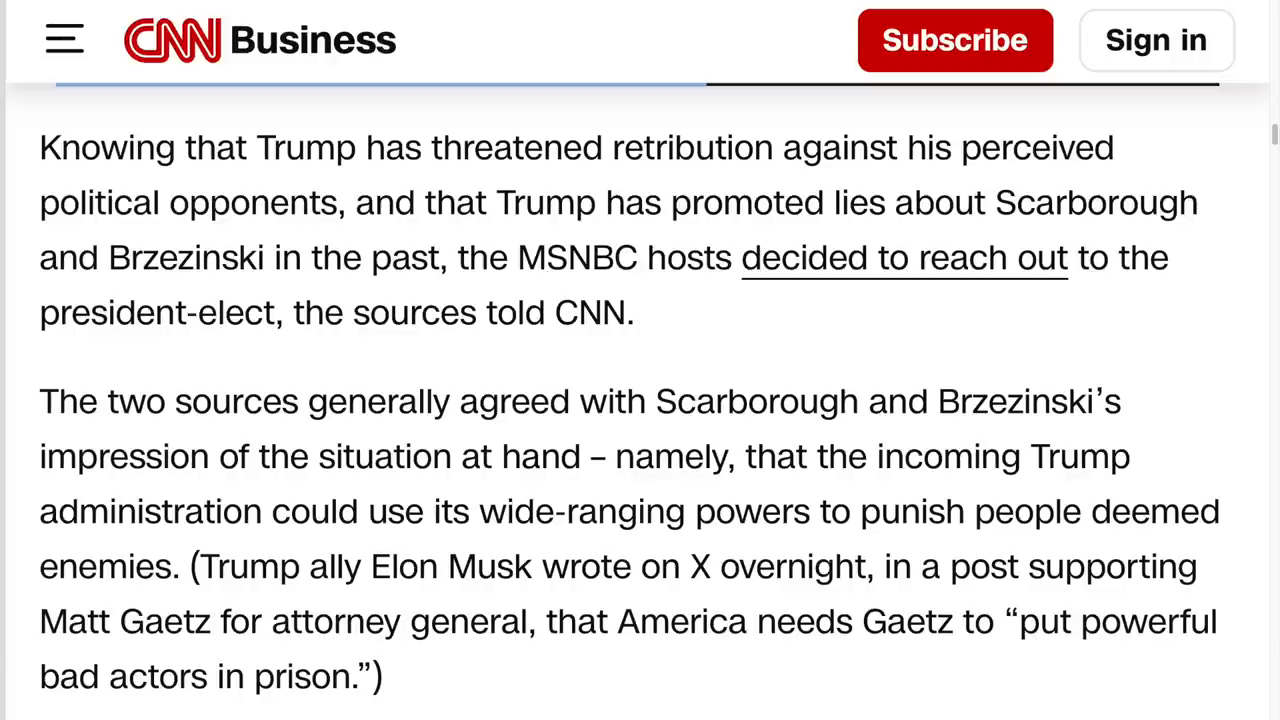The Mar-a-Lago Meeting with Trump by Morning Joe’s Hosts
The dynamics surrounding the secret meeting between Joe Scarborough, Mika Brzezinski, and President-elect Donald Trump is being heavily scrutinized. The conversation highlighted the contentious political climate, with critics on the left accusing Scarborough and Brzezinski of normalizing Trump. However, it was pointed out that over seventy-five million American voters had already done so by electing him. This sentiment was echoed in the media, where some commentators expressed outrage at the perceived normalization of Trump by prominent figures.
Scarborough and Brzezinski’s visit to Mar-a-Lago marked their first meeting with Trump in seven years, during which they addressed a range of pressing issues, including abortion, mass deportation, and threats of political retribution against opponents and media outlets. The implications of this meeting are significant, as it reflects the ongoing tensions and debates within the political landscape.
“Actually think it was the right thing to do… We talked about a lot of issues, including abortion, mass deportation…”
Reactions and Backlash
The aftermath of the meeting between Joe Scarborough, Mika Brzezinski, and President-elect Donald Trump was marked by significant backlash and mixed reactions within the media community. Following their visit to Mar-a-Lago, Scarborough and Brzezinski faced considerable criticism, particularly from their colleagues at MSNBC. While Scarborough defended the meeting as a necessary step to maintain communication with a world leader, concerns loomed over potential governmental and legal repercussions from the incoming Trump administration.
Sources revealed that both hosts were apprehensive about the possibility of facing harassment due to Trump’s history of targeting perceived political adversaries. This sentiment was echoed by some of their colleagues, who recognized the precarious nature of engaging with the Trump administration. The public’s response, particularly on social media, reflected a mix of skepticism and disapproval, with many questioning the wisdom of normalizing Trump’s presidency. As one commentator noted, “Normalizing Trump as a bad idea period.” This incident highlights the ongoing tension between media figures and political power, raising questions about the implications of such interactions in the current political climate.
Implications for Media and Politics
The recent meeting involving MSNBC hosts and the president-elect has raised significant concerns regarding media integrity and the ethical responsibilities of journalists. As the political landscape shifts, the implications for media outlets like MSNBC, known for their progressive stance, are profound.
A variety of opinions have emerged among MSNBC staff regarding the potential repercussions of this meeting. Some employees expressed a pragmatic view, suggesting that maintaining access to the president-elect is crucial for effective reporting. However, this perspective is complicated by the network’s portrayal of Trump as a potential dictator, leading to accusations of capitulation to political power.
In the wake of the meeting, MSNBC host Katie Fang publicly criticized the normalization of Trump, indicating a divide within the network. This sentiment was echoed by other staff members who fear they may become targets of political retribution. Democratic consultant Chuck Rocha articulated this concern, suggesting that the hosts may be motivated by a desire to avoid audits or scrutiny.
Media critic Jeff Jarvis described the meeting as a “betrayal” of MSNBC staff who continue to criticize Trump, highlighting the precarious position they find themselves in. The threat of retribution from Trump and his allies has been underscored by figures like Steve Bannon, who warned MSNBC staff to safeguard their documents in anticipation of potential investigations.
Despite these fears, some within MSNBC believe that concerns about political targeting are exaggerated. Management reportedly does not share the apprehensions expressed by some employees regarding the meeting. This divergence in perspectives illustrates the complex dynamics at play within media organizations navigating a politically charged environment.
“The bended knee was a betrayal of the staff at MSNBC…”

This situation underscores the delicate balance media organizations must maintain between access to power and adherence to journalistic ethics.
Conclusion and Future Outlook
The recent reactions to Joe Scarborough’s engagement with Donald Trump highlight a significant tension in political discourse today. Viewers are not merely concerned; they are outraged. Scarborough’s attempt to share a positive quote from Trump about open communication was met with a barrage of negative feedback, primarily from loyal MSNBC fans. In response, Scarborough removed his post, suggesting that the backlash did not reflect broader public sentiment.
He noted on air that he received numerous supportive phone calls from around the world, emphasizing a desire for constructive dialogue. “All of us will do the best we can, and we’re all working toward a better America,” he stated, echoing a sentiment of gradual progress.
Scarborough’s assertion that “you can predict the future by shaping the future” encapsulates a forward-looking approach to political engagement. As he navigates a less hostile relationship with the incoming president, it raises questions about the future of political discourse and the media’s role in it. The challenge remains for journalists to balance engagement with accountability, ensuring that their audience is not misled by disingenuous narratives.
In this politically charged environment, the role of journalists is more critical than ever. They must strive to foster open communication while remaining vigilant against the potential pitfalls of normalization. As Scarborough and his team take it “day by day,” the evolving landscape of media and politics will undoubtedly shape the future of public discourse.
“You can predict the future by shaping the future.”
